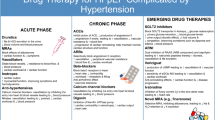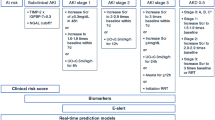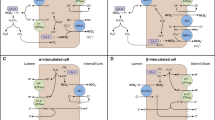Abstract
No large cohort study has yet determined the incidence of acute kidney injury (AKI) in children with heart failure treated with renin–angiotensin system (RAS) inhibitors. We thus retrospectively analyzed the incidence and risk factors for severe AKI (stages 2–3 according to the Kidney Disease Improving Global Outcomes (KDIGO) guidelines) at our institutions from 2008 to 2011. Among 312 children (162 boys; median age, 7.3 months), 59 cases of AKI occurred in 45 children. The incidence of AKI was 14.3 cases per 100 person-years overall (follow-up 413.6 person-years), or 27.3, 16.8, and 4.5 cases per 100 person-years in children aged <1, 1–3, and ≥4 years, respectively. Among them, 23 (39.0 %) children had metabolic acidosis and 14 (23.7 %) had hyperkalemia. Younger age, myocardial disease, cyanotic congenital heart disease, use of spironolactone, and cardiac surgery were independent risk factors for AKI. Furthermore, 37.3 % of children suffered dehydration during AKI.
Conclusion: AKI incidence is relatively high in children, particularly younger children, with heart failure treated using RAS inhibitors. Careful monitoring of renal function and serum electrolytes is essential. Proper management of fluid balance after infection and cardiac surgery may reduce the risk of AKI. Temporary discontinuation in RAS inhibitors should be considered during dehydration or surgery.
What is known: |
• Angiotensin-converting enzyme inhibitors (ACEIs) and angiotensin receptor blockers (ARBs) are the two main classes of renin–angiotensin system (RAS) inhibitors used to treat hypertension, heart failure, and chronic kidney disease. Acute kidney injury (AKI) and hyperkalemia are potentially life-threatening complications associated with the use of ACEIs and ARBs. Some reports have suggested that dehydration and cardiac surgery are risk factors for AKI in children. However, no large-scale cohort studies have determined the incidence of AKI, its risk factors, and its outcomes in children with heart failure treated with ACEIs and/or ARBs. |
What is new: |
• In this retrospective cohort study, we determined the incidence, severity, and risk factors for severe AKI in children with heart failure treated with ACEIs and/or ARBs. The incidence of AKI in these children was relatively high (14.3 episodes per 100 person-years). In addition, younger age, myocardial disease, cyanotic congenital heart disease, concomitant use of spironolactone, and cardiac surgery were risk factors for AKI. Furthermore, 37.3 % of children had dehydration during AKI episodes. |
• Our results suggested that appropriate fluid balance after infection and cardiac surgery might reduce the risk of AKI and its complications. Temporary discontinuation or reductions in the levels of ACEIs and/or ARBs during dehydration or before surgery may also be warranted in these patients. |



Similar content being viewed by others
Abbreviations
- ACEI:
-
angiotensin-converting enzyme inhibitor
- AKI:
-
acute kidney injury
- ARB:
-
angiotensin receptor blocker
- CHF:
-
chronic heart failure
- CKD:
-
chronic kidney disease
- eGFR:
-
estimated glomerular filtration rate
- KDIGO:
-
Kidney Disease Improving Global Outcomes
- RAS:
-
renin–angiotensin system
References
Kunz R, Friedrich C, Wolbers M, Mann JF (2008) Meta-analysis: effect of monotherapy and combination therapy with inhibitors of the renin–angiotensin system on proteinuria in renal disease. Ann Intern Med 148:30–48. doi:10.7326/0003-4819-148-1-200801010-00190
Maschio G, Alberti D, Janin G, Locatelli F, Mann JF, Motolese M, Ponticelli C, Ritz E, Zucchelli P (1996) Effect of the angiotensin-converting-enzyme inhibitor benazepril on the progression of chronic renal insufficiency. The Angiotensin-Converting–Enzyme Inhibition in Progressive Renal Insufficiency Study Group. N Engl J Med 334:939–945. doi:10.1056/NEJM199604113341502
Ishikura K, Uemura O, Ito S, Wada N, Hattori M, Ohashi Y, Hamasaki Y, Tanaka R, Nakanishi K, Kaneko T, Honda M, Pediatric CKD Study Group in Japan in conjunction with the Committee of Measures for Pediatric CKD of the Japanese Society of Pediatric Nephrology (2013) Pre-dialysis chronic kidney disease in children: results of a nationwide survey in Japan. Nephrol Dial Transplant 28:2345–2355. doi:10.1093/ndt/gfs611
Ellis D, Vats A, Moritz ML, Reitz S, Grosso MJ, Janosky JE (2003) Long-term antiproteinuric and renoprotective efficacy and safety of losartan in children with proteinuria. J Pediatr 143:89–97. doi:10.1016/S0022-3476(03)00279-8
Ma TK, Kam KK, Yan BP, Lam YY (2010) Renin-angiotensin-aldosterone system blockade for cardiovascular diseases: current status. Br J Pharmacol 160:1273–1292. doi:10.1111/j.1476-5381.2010.00750.x
Kidney Disease: Improving Global Outcomes (KDIGO) Acute Kidney Injury Work Group (2012) KDIGO clinical practice guideline for acute kidney injury. Kidney Int Suppl 2:1–138. doi:10.1038/kisup.2012.3
JCS Joint Working Group (2014) Guidelines for drug therapy in pediatric patients with cardiovascular diseases (JCS 2012). Digest version. Circ J 78:507–533. doi:10.1253/curcj.CJ-66-0083
Hsu DT, Pearson GD (2009) Heart failure in children: part I: history, etiology, and pathophysiology. Circ Heart Fail 2:63–70. doi:10.1161/CIRCHEARTFAILURE.108.820217
Uemura O, Nagai T, Ishikura K, Ito S, Hataya H, Gotoh Y, Fujita N, Akioka Y, Kaneko T, Honda M (2014) Creatinine-based equation to estimate the glomerular filtration rate in Japanese children and adolescents with chronic kidney disease. Clin Exp Nephrol 18:626–633. doi:10.1007/s10157-013-0856-y
Schwartz GJ, Muñoz A, Schneider MF, Mak RH, Kaskel F, Warady BA, Furth SL (2009) New equations to estimate GFR in children with CKD. J Am Soc Nephrol 20:629–637. doi:10.1681/ASN.2008030287
Stirling C, Houston J, Robertson S, Boyle J, Allan A, Norrie J, Isles C (2003) Diarrhoea, vomiting and ACE inhibitors: an important cause of acute renal failure. J Hum Hypertens 17:419–423. doi:10.1038/sj.jhh.1001571
Tullus K (2011) Safety concerns of angiotensin receptor blockers in preschool children. Arch Dis Child 96:881–882. doi:10.1136/archdischild-2011-300172
Cittanova ML, Zubicki A, Savu C, Montalvan C, Nefaa N, Zaier K, Riou B, Coriat P (2001) The chronic inhibition of angiotensin-converting enzyme impairs postoperative renal function. Anesth Analg 93:1111–1115. doi:10.1097/00000539-200111000-00008
Colson P, Ribstein J, Mimran A, Grolleau D, Chaptal PA, Requeleuil B (1990) Angiotensin converting enzyme inhibition on blood pressure and renal function during open heart surgery. Anesthesiology 72:23–27. doi:10.1097/00000542-199001000-00005
Licker M, Neiddhart P, Lustenberger S, Pretre R, Montessuit M, Favre H, Morel DR (1996) Preoperative inhibition of angiotensin converting enzyme improves systemic and renal hemodynamic changes during aortic abdominal surgery. Br J Anesth 76:632–639. doi:10.1093/bja/76.5.632
Arora P, Rajagopalam S, Ranjan R, Kolli H, Singh M, Venuto R, Lohr J (2008) Preoperative use of angiotensin-converting enzyme inhibitors/angiotensin receptor blockers is associatedwith increased risk for acute kidney injury after cardiovascular surgery. Clin J Am Soc Nephrol 3:1266–1273. doi:10.2215/CJN.05271107
Chiravuri SD, Riegger LQ, Christensen R, Butler RR, Malviya S, Tait AR, Voepel-Lewis T (2011) Factors associated with acute kidney injury or failure in children undergoing cardiopulmonary bypass: a case-controlled study. Paediatr Anaesth 21:880–886. doi:10.1111/j.1460-9592.2011.03532.x
Skippen PW, Krahn GE (2005) Acute renal failure in children undergoing cardiopulmonary bypass. Crit Care Resusc 7:286–291
Weir RA, McMurray JJ, Puu M, Solomon SD, Olofsson B, Granger CB, Yusuf S, Michelson EL, Swedberg K, Preffer MA, CHARM Investigators (2008) Efficacy and tolerability of adding an angiotensin receptor blocker in patients with heart failure already receiving an angiotensin-converting inhibitors plus aldosterone antagonist, with or without a beta blocker. Findings from the Candesartan in Heart failure: Assessment of Reduction in Mortality and morbidity (CHARM)-Added trial. Eur J Heart Fail 10:157–163. doi:10.1016/j.ejheart.2007.12.006
Bianchi S, Bigazzi R, Campese VM (2005) Antagonists of aldosterone and proteinuria in patients with CKD: an uncontrolled pilot study. Am J Kidney Dis 46:45–51. doi:10.1053/j.ajkd.2005.03.007
Acknowledgments
The authors wish to thank Nicholas Smith, PhD, an employee of Edanz Group Ltd, for providing the language editorial support in the preparation of this manuscript.
Authors’ contributions
We confirm that all authors have made substantial contributions to the conception and design, or acquisition of data, or analysis and interpretation of data, or to the drafting of the article or its critical revision for important intellectual content. Further, we confirm that all authors have given final approval of the version to be published and its submission to the European Journal of Pediatrics.
In particular, each author made the following contributions:
Chikako Terano: Dr. Terano was the principal investigator and prepared the manuscript.
Kenji Ishikura: Dr. Ishikura oversaw the research.
Masaru Miura: Dr. Miura established the treatment protocol for pediatric heart failure for our institution that was used in this study and also established the database of all children treated for heart failure.
Riku Hamada, Ryoko Harada: Drs. Hamada and Harada performed the data management.
Tomoyuki Sakai and Yuko Hamasaki: Drs. Sakai and Hamasaki collected the data.
Takashi Ando: Mr. Ando performed the statistical analyses.
Masataka Honda and Hiroshi Hataya: Drs. Honda and Hataya planned the survey and designed the protocol.
Author information
Authors and Affiliations
Corresponding author
Ethics declarations
The present study was designed and conducted in accordance with the ethical standards of the Declaration of Helsinki and the ethical guidelines for epidemiological studies issued by the Ministry of Health, Labour and Welfare in Japan. This study was approved by the ethics committee of Tokyo Metropolitan Children’s Medical Center (ID: H23-112) before starting data collection. Because data were retrospectively retrieved from the patients’ medical records, informed consent was not obtained in accordance with these ethical guidelines.
Conflict of interest
Kenji Ishikura has received lecture fees from Novartis Pharma. Yuko Hamasaki has received research grants from Novartis Pharma and lecture fees from Novartis Pharma and Astellas Pharma. Masataka Honda has received lecture fees from Novartis Pharma and Takeda Pharmaceutical Company. The other authors have no conflicts of interest to declare.
Additional information
Communicated by Mario Bianchetti
Revisions received: 14 August 2015; 16 November 2015
Rights and permissions
About this article
Cite this article
Terano, C., Ishikura, K., Miura, M. et al. Incidence of and risk factors for severe acute kidney injury in children with heart failure treated with renin–angiotensin system inhibitors. Eur J Pediatr 175, 631–637 (2016). https://doi.org/10.1007/s00431-015-2680-8
Received:
Revised:
Accepted:
Published:
Issue Date:
DOI: https://doi.org/10.1007/s00431-015-2680-8




